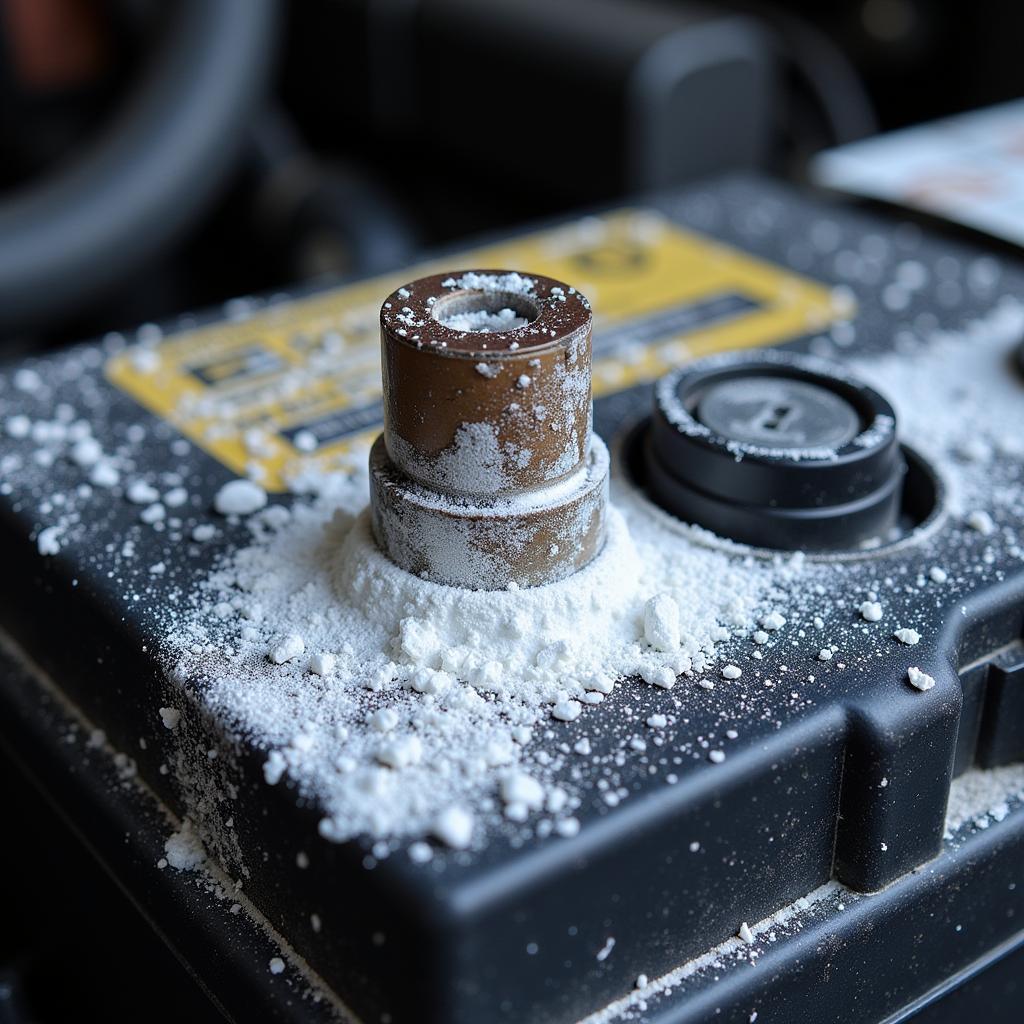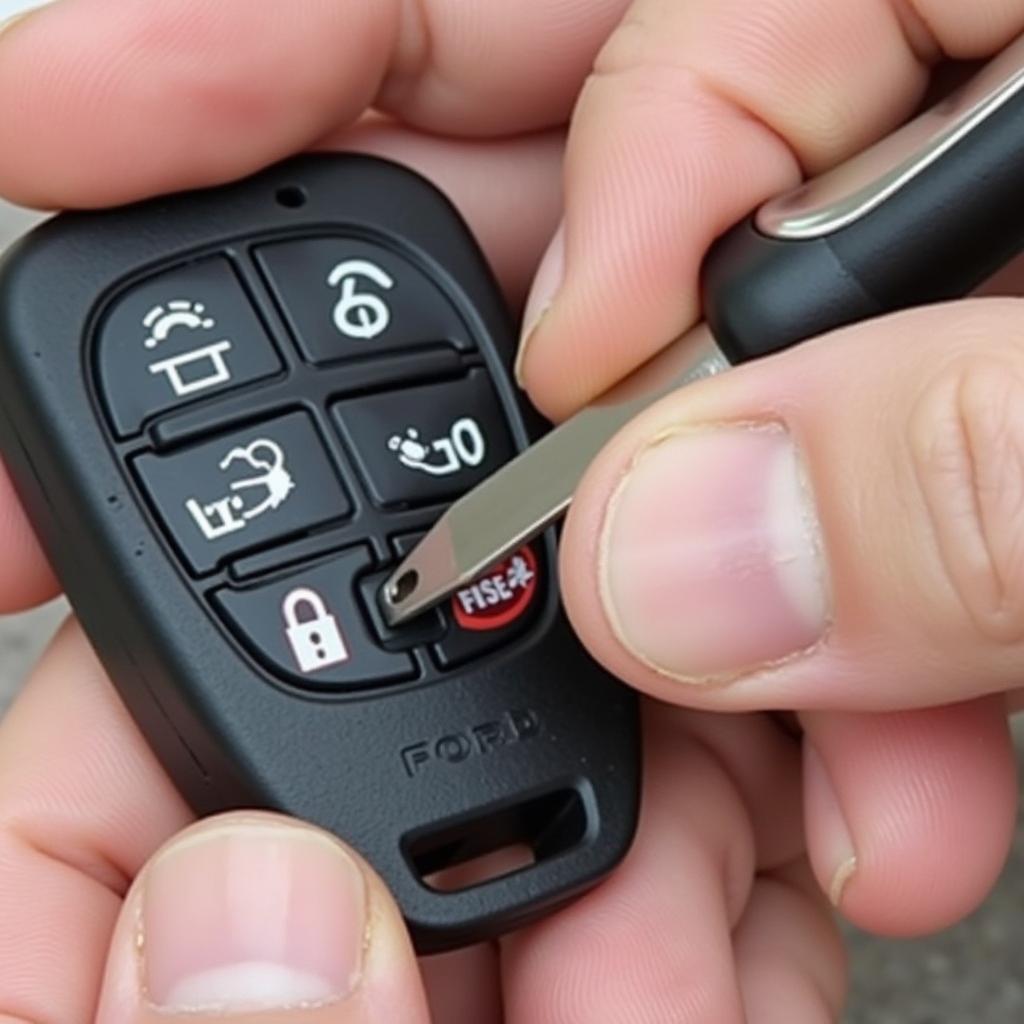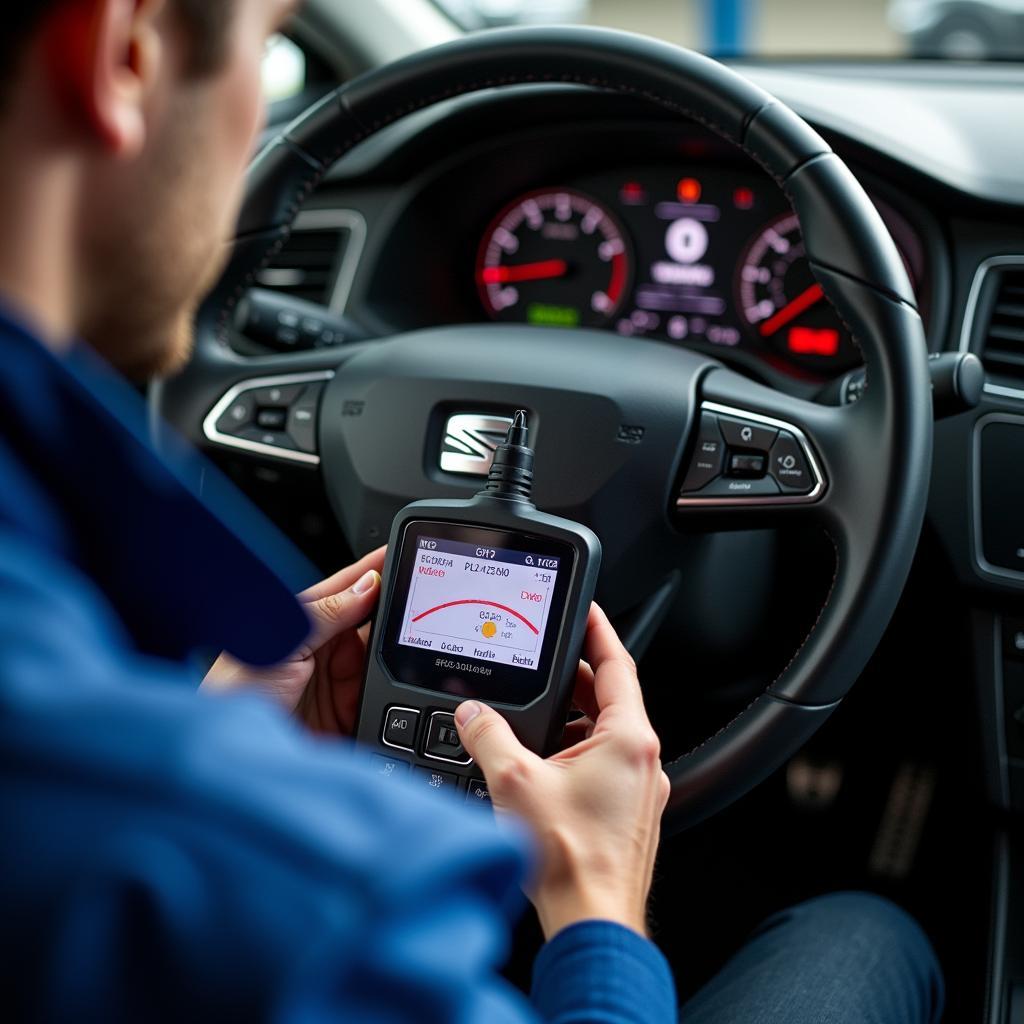A failing car battery can be a major inconvenience, leaving you stranded and frustrated. Recognizing the symptoms of failing battery is crucial for preventing such scenarios. This guide provides a detailed overview of the common, and some not-so-common, symptoms of failing battery, helping you address the issue proactively.
 Car Battery Corrosion: A Common Symptom of Failing Battery
Car Battery Corrosion: A Common Symptom of Failing Battery
Common Symptoms of Failing Battery
A dying battery often exhibits several telltale signs. One of the most obvious symptoms of failing battery is a slow engine crank. When you turn the key, the engine might struggle to turn over or take longer than usual to start. Dim headlights, especially when the engine is idling, are another common indicator. Clicking sounds when you turn the key can point to a battery that lacks the power to engage the starter. Other signs include a swollen battery case, often due to excessive heat, and a rotten egg smell caused by leaking battery acid.
Other Indicators of a Failing Car Battery
Beyond the typical symptoms, there are less obvious signs of a failing battery. Electrical components, like power windows and the radio, may malfunction or operate sluggishly. The check engine light might illuminate unexpectedly. In some cases, the car’s computer might register unusual error codes related to low voltage. Moreover, you might need to jump-start your car frequently, a sure sign that the battery isn’t holding a charge effectively. Lastly, a battery that’s older than three to five years is statistically more prone to failure, even if it appears to be functioning normally.
Why Recognizing Failing Battery Symptoms Matters
Early detection of failing battery symptoms can save you time, money, and potential hazards. A dead battery can leave you stranded in inconvenient and potentially unsafe situations. Replacing a battery before it completely fails avoids this hassle. Furthermore, a failing battery can strain other car components, leading to more expensive repairs down the line. Recognizing the symptoms allows for timely intervention, preventing costly damage to the starter, alternator, and other electrical systems.
What to Do When Your Battery Shows Signs of Failure
If you notice any symptoms of failing battery, it’s crucial to take prompt action. First, have your battery tested by a qualified mechanic or at an auto parts store. A battery test will confirm whether the battery is indeed the culprit. If the battery is failing, replace it with a new one as soon as possible. Ensure the new battery is the correct type and size for your vehicle. It’s also recommended to have your charging system inspected to rule out any underlying issues that might be contributing to the battery’s demise. Preventative maintenance, such as regularly cleaning the battery terminals and checking the battery’s charge level, can help prolong its lifespan.
“A proactive approach to car maintenance, especially concerning the battery, can prevent unexpected breakdowns and costly repairs,” says John Smith, a Senior Automotive Electrical Engineer at Acme Auto Solutions.
How Remote Diagnostics and Software Solutions Can Help
Modern technology offers innovative solutions for diagnosing and addressing car battery issues. Remote diagnostics and software programming allow technicians to access and analyze your car’s data remotely, identifying potential problems before they escalate. These tools can monitor battery performance, detect early signs of failure, and even perform remote software updates that can optimize battery management. This proactive approach helps maximize battery life and prevent unexpected breakdowns.
“Remote diagnostics is revolutionizing car maintenance, providing a convenient and efficient way to diagnose and address battery issues,” adds Jane Doe, Lead Software Engineer at CarDiagTech.
Conclusion
Understanding the symptoms of failing battery is essential for responsible car ownership. From slow engine cranks and dim headlights to less obvious signs like malfunctioning electrical components and frequent jump-starts, recognizing these symptoms can save you from frustrating and potentially dangerous situations. By taking proactive steps, like regular battery testing and utilizing remote diagnostics solutions, you can ensure your car’s electrical system remains healthy and reliable. Don’t wait for your battery to completely die; addressing the symptoms early on will keep you on the road and avoid costly repairs.
car not starting battery is good
FAQ
-
How often should I have my car battery tested? Ideally, every six months, especially during extreme weather conditions.
-
How long does a car battery typically last? Most car batteries have a lifespan of three to five years.
-
Can I replace my car battery myself? Yes, but it’s recommended to seek professional help if you’re unfamiliar with the process.
-
What causes a car battery to fail prematurely? Several factors can contribute to premature battery failure, including extreme temperatures, excessive vibration, and faulty charging systems.
-
How can I prevent my car battery from failing? Regular maintenance, like cleaning the terminals and checking the charge level, can help prolong battery life.
-
What should I do if my car battery dies while I’m driving? Pull over to a safe location and call for roadside assistance.
-
Are there any signs that my car battery is about to die completely? Yes, some signs include extremely dim headlights, flickering interior lights, and a complete inability to start the engine.



